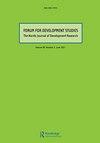Participation in Climate Change Adaptation Programs in Nepal: An Intersectional Study
IF 1.1
Q3 DEVELOPMENT STUDIES
引用次数: 3
Abstract
Abstract In the social discourses of climate change, women are perceived both as vulnerable victims and as active players in adaptation. These perceptions of women along with inclusion policies have led climate change adaptation programs to seek women’s participation. However, ‘women’ is not a homogenous category. Intra-gender power differences in terms of castes and ethnicities can play an important role, especially in Nepal with its long history of institutionalized disparities. Using qualitative methodology, this study explores the relationships between gender, caste and ethnicity in shaping women’s participation in climate change adaptation programs in the southern plains of Nepal. We conclude that women’s gender identities generally facilitated their participation and that affirmative action for marginalized groups, to some extent, gave women from these groups spaces to participate in climate change adaptation programs. However, power relations associated with caste/ethnic identity created hindrances for marginalized women, implying that they had more restricted access than women from the majority groups.尼泊尔参与气候变化适应项目:一项交叉研究
摘要在气候变化的社会话语中,妇女既被视为脆弱的受害者,又被视为适应气候变化的积极参与者。这些对妇女的看法以及包容性政策促使气候变化适应计划寻求妇女的参与。然而,“妇女”并不是一个同质的类别。种姓和种族方面的性别内部权力差异可以发挥重要作用,尤其是在尼泊尔,其制度化差异由来已久。本研究采用定性方法,探讨了性别、种姓和种族在尼泊尔南部平原妇女参与气候变化适应计划方面的关系。我们得出的结论是,妇女的性别认同通常有助于她们的参与,对边缘化群体的平权行动在某种程度上为这些群体的妇女提供了参与气候变化适应计划的空间。然而,与种姓/族裔身份相关的权力关系为边缘化妇女制造了障碍,这意味着她们比多数群体的妇女更受限制。
本文章由计算机程序翻译,如有差异,请以英文原文为准。
求助全文
约1分钟内获得全文
求助全文
来源期刊

FORUM FOR DEVELOPMENT STUDIES
DEVELOPMENT STUDIES-
CiteScore
1.80
自引率
14.30%
发文量
24
期刊介绍:
Forum for Development Studies was established in 1974, and soon became the leading Norwegian journal for development research. While this position has been consolidated, Forum has gradually become an international journal, with its main constituency in the Nordic countries. The journal is owned by the Norwegian Institute of International Affairs (NUPI) and the Norwegian Association for Development Research. Forum aims to be a platform for development research broadly defined – including the social sciences, economics, history and law. All articles are double-blind peer-reviewed. In order to maintain the journal as a meeting place for different disciplines, we encourage authors to communicate across disciplinary boundaries. Contributions that limit the use of exclusive terminology and frame the questions explored in ways that are accessible to the whole range of the Journal''s readership will be given priority.
 求助内容:
求助内容: 应助结果提醒方式:
应助结果提醒方式:


